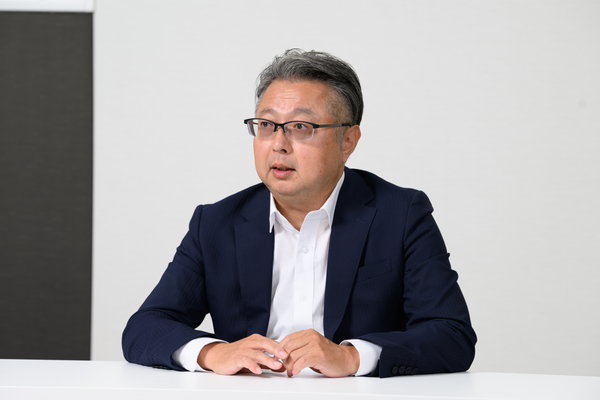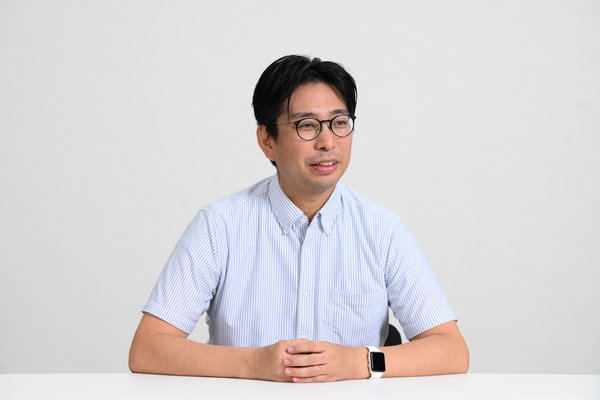Software That Creates Synergy With Technological Capabilities

EBARA Maintenance Cloud Using IoT Sensors and the Cloud: EBARA Takes on New Challenges in Software and Value Creation
In addition to manufacturing products such as pumps and semiconductor manufacturing equipment, EBARA Corporation also uses the data obtained from these products to provide software and solutions that address customer problems. As a field, this could be called value creation, as opposed to manufacturing. One example is the EBARA Maintenance Cloud.
By installing wireless sensors on EBARA products such as pumps, air blowers, and chillers in operation in various locations throughout Japan, the EBARA Maintenance Cloud remotely monitors the operation data in real time in the cloud. This service quickly detects signs of abnormal conditions or failures based on the sensor data and sends notifications over email.
In charge of the development were Yasumasa Yamada (Solution System Development Section of the Solution Business Development Department, part of the Development Division at the Building Service & Industrial Company) and Bunshi Ono (Smart Solution Section of the Sales Strategy Promotion Department, part of the Domestic Business Division; Ono was part of the Product Planning Department at the time of the development). Both note that it is because EBARA excels in manufacturing and hardware that it can create valuable software. We asked Yamada and Ono about the journey to create the EBARA Maintenance Cloud as well as the unique strengths EBARA offers in the field of software.
We wanted to create a sense of security, that EBARA was always keeping watch
—How did the idea for the EBARA Maintenance Cloud come about?

Ono—If the EBARA products a customer is using stop due to a failure or abnormality, it will of course have a significant impact. Commercial facilities and restaurants may have to stop operations; factories may even shut down. In order to avoid such problems, it is of course important to make products that do not fail easily. But if we can quickly detect changes in a product or signs of failure using sensor data, we will be able to deal with them beforehand. We developed this service with that idea in mind.
EBARA has sales offices and cooperating stores all over Japan, and we are confident in our after-sales services such as repairs and inspections following product installation. It would be of great significance if we could always keep track of the status of the products at our customers' sites through the cloud, and if an emergency were to occur, staff in the relevant area would be able to arrive and respond immediately. There have already been cases of this, and I think it would give customers a sense of security that EBARA is always keeping watch.
Yamada—We also wanted to strengthen our connections with customers after the installation of our products. Pumps and blowers are generally installed through construction companies, equipment companies, and distributors. We see the products on site during regular inspections and repairs. We wanted to create an opportunity to learn more about how EBARA products are used on site and how they are operating. This information will help us understand new challenges facing our customers and let us develop new ideas for creating better products going forward.
Yamada: EBARA is not only focused on manufacturing; it is also focused on value creation, on creating software and solutions that solve problems facing customers. Our team's mission is to develop the necessary systems and apps to enable this, and this cloud service is one element of this. I have been in charge of everything from planning to system design and development.
Ono—The two of us worked together on a single purpose, so we became pretty good friends (laughs). The EBARA Maintenance Cloud was officially released in November 2022. I was transferred from the Product Development Planning Department, where I was at the time of development, to the Sales Department. Here, I am now moving the project forward as a service manager.
Sensor locations, configuring data ... Software technology alone is not enough
—In advancing development, did you experience any difficulties or hardships different from those of manufacturing?
Ono—When it comes to manufacturing, EBARA has a history of over 100 years, and we have a good understanding of what products are needed in the market. However, there are few examples of making cloud services or software, and this was my own first attempt. So, we started by understanding the needs of our customers. It was difficult to think about how to gather information on these needs from scratch.

Yamada—During the development, we repeated the cycle of having customers use the system prototype, collecting their feedback, and incorporating it to improve the system. Improve and implement, listen to customer feedback, and improve again. And do it with speed. Keeping that cycle going was the toughest part.
Ono—The thing about software is that it can keep improving. And it is no exaggeration to say that the speed at which the problems that we find can be improved on directly affects the success of the service. Yamada and I had heated discussions every day.
Yamada: At times, we had strict demands to deal with (laughs). The official release is not the end, but rather just the beginning. The cycle of improving the system based on the feedback of customers who use it will continue.
At the same time, the process of making improvements while listening to customer feedback is rewarding. That is because we can hear directly from customers about the results they have actually seen while using it and how useful this service was for them. A customer once told us that the service really saved them because it detected an abnormality that no one had noticed yet.
—For EBARA, which has a long history of manufacturing, what did you feel was the significance of taking on software development and value creation?
Yamada—This service does not require just sensors and the cloud to be useful. For example, knowledge of equipment and manufacturing sites is required to consider what kind of changes occurring in a pump indicate an abnormality, where the line is that separates abnormalities from normal operations, and where to draw the thresholds for sending notifications. It is also impossible to collect the needed data if you do not choose the appropriate point for the sensor. EBARA has the fundamental product and on-site expertise that allows us to create such useful systems. Going forward, by adding AI analysis technology to this expertise, it will be possible for us to perform more advanced condition monitoring.
One more thing is that EBARA has sales offices and cooperating stores all over Japan, and we have a comprehensive follow-up system in place in case any failures occur. The synergy between EBARA's strengths and remote monitoring systems is important. Even if a failure is detected, if no one is able to be on site, we cannot solve the customer's problem. Although it is software that detects the abnormality, the resulting repair work requires human labor. We can create a meaningful service because we have capabilities in both areas.
In order to take advantage of EBARA's strengths, we would like to focus more and more on software development in the future, and it would be great if more engineers become skilled at that kind of development. I think EBARA is a company that offers rewarding work for those who think that society will improve by combining industrial machinery with software and IoT.
As more products are monitored in the cloud, replacement parts can be ordered ahead of time
―In the future, there will be more cases of services being developed together with mid-career software engineers. You two had exactly that kind of relationship. How was it working together?
Ono—I have been with EBARA for a long time, and Yamada is a mid-career hire. Working with mid-career hires who have experience at other companies gives us a chance to rethink whether what we consider normal or obvious is really true. You could say that it allows us to go back to the basics. I hope there is more of this kind of interaction in the future.
Yamada—I feel that it is easy to work here for people like me who come from outside the company. Instead of each individual engineer using their own skills and knowledge and going it alone, they actively share these with others. Within our section, we have created a database of technical information and are working on the formalization of skills and expertise. We also hold regular study sessions on new technologies.
There are no divisions by careers, and, simply put, there are many kind and serious people here. I believe that value creation and the manufacturing of EBARA products, which support the daily life and economic foundations of society, have great social significance. I want to work together with young people, who will be responsible for the future.
—Finally, what are your goals for the future?
Yamada—Cloud monitoring services with sensors can improve the overall work at the company. For example, if the number of products whose operation status can be determined by sensors increases, the total number of EBARA pumps that are currently operating and the number of products that are about to be replaced regularly can be determined, and parts can be ordered in advance. We can also establish a service system for our customers, and that will become one solution.
Ono—I think EBARA can become a better company by adopting software and IoT, or AI, and I want to be involved in that. But that's not to say that we're going to replace our conventional sales style or business style with new technologies. Like the after-sales service I mentioned earlier, EBARA's appeal and strengths lie in the capacities we have developed so far.
It is important to put customer utility first. And in order to do this, I want to take advantage of the strengths we have developed thus far and incorporate new technologies. I would like us to explore what form that takes in our own way.
※Department names are as of 2023/12

